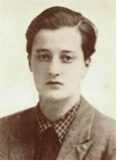 Valentine Ackland was the pseudonym used by a 20th century female English poet who eventually earned a place in literary history as being part of the philosophical movement known as Modernism that was prevalent in western society at that time.
Valentine Ackland was the pseudonym used by a 20th century female English poet who eventually earned a place in literary history as being part of the philosophical movement known as Modernism that was prevalent in western society at that time.
She was born Mary Kathleen Macrory Ackland on the 20th May 1906. She was known as “Molly” by her parents and had a disturbed childhood as her father, a London dentist, soon set about turning her into the son he never had. The young girl was taught to shoot and box and received so much attention that her older sister was intensely jealous, so much so that she bullied her remorselessly.
To add to her confusion, she endured a mixture of Anglican and Catholic influences and she then attended a convent school in London. Perhaps it was a reaction to her oppressive upbringing that, at the age of 19, she contracted an unsuitable marriage with a known homosexual. It failed and was annulled within a year and it is likely that this proved to be her last relationship with a man. Molly was a sensitive young woman and had already started writing poetry while being acutely aware of the unequal privileges enjoyed by men at the expense of women throughout society.
It seemed the natural thing to turn herself into a “man” in the eyes of the world. She had her hair cropped short and started wearing male clothing. It was at this time that she adopted the name Valentine Ackland, which fitted in well with her now androgynous appearance. Perhaps she was shunned by literary society as most of her work was not published until the 1970s, after her death. She did, though, manage to get some poetry published in magazines and literary journals in Britain and America.
In 1930 she began a life-long relationship with a fellow writer called Sylvia Townsend Warner. It was an intimate arrangement but not without problems, especially when it became clear that Ackland was becoming an alcoholic as well as displaying evidence of regular infidelity with other women. Despite this they stayed together for 39 years.
Sometime during the 1940s she started work on a book concerning her thoughts on love and life with Warner, and others, in a book which was finally published in 1985 called For Sylvia: An Honest Account. The would-be recipient of these confessions did not live to read them though as she died in 1978. As a poet she often revealed her serious, intense character, an example being a 1936 poem called Instructions from England which was about the perceived indifference of the British government to the suffering of the Spanish people at the hands of the Fascists in their civil war. Here is an extract from that poem:

While being openly supportive of the communists at this time, other work reveals her confusion and insecurities regarding her faith, her sexual orientation and her political convictions. She was, though, jointly responsible with Warner for a volume of poetry called Whether a Dove or a Seagull, published in 1934. Some of the pieces were open discussions of lesbianism at a time when this kind of behaviour was seen as deeply immoral.
Critics who have reviewed her work have compared it to the likes of Sylvia Plath and Anne Sexton. Others have alluded that her constant search for a place in the world where she could be accepted for what she was – both a committed lesbian and a poet of some worth – place her amongst the metaphysical poets such as Philip Larkin and John Donne.
Valentine Ackland lost a long battle with breast and lung cancer and died on the 9th November 1969 at the age of 63.

